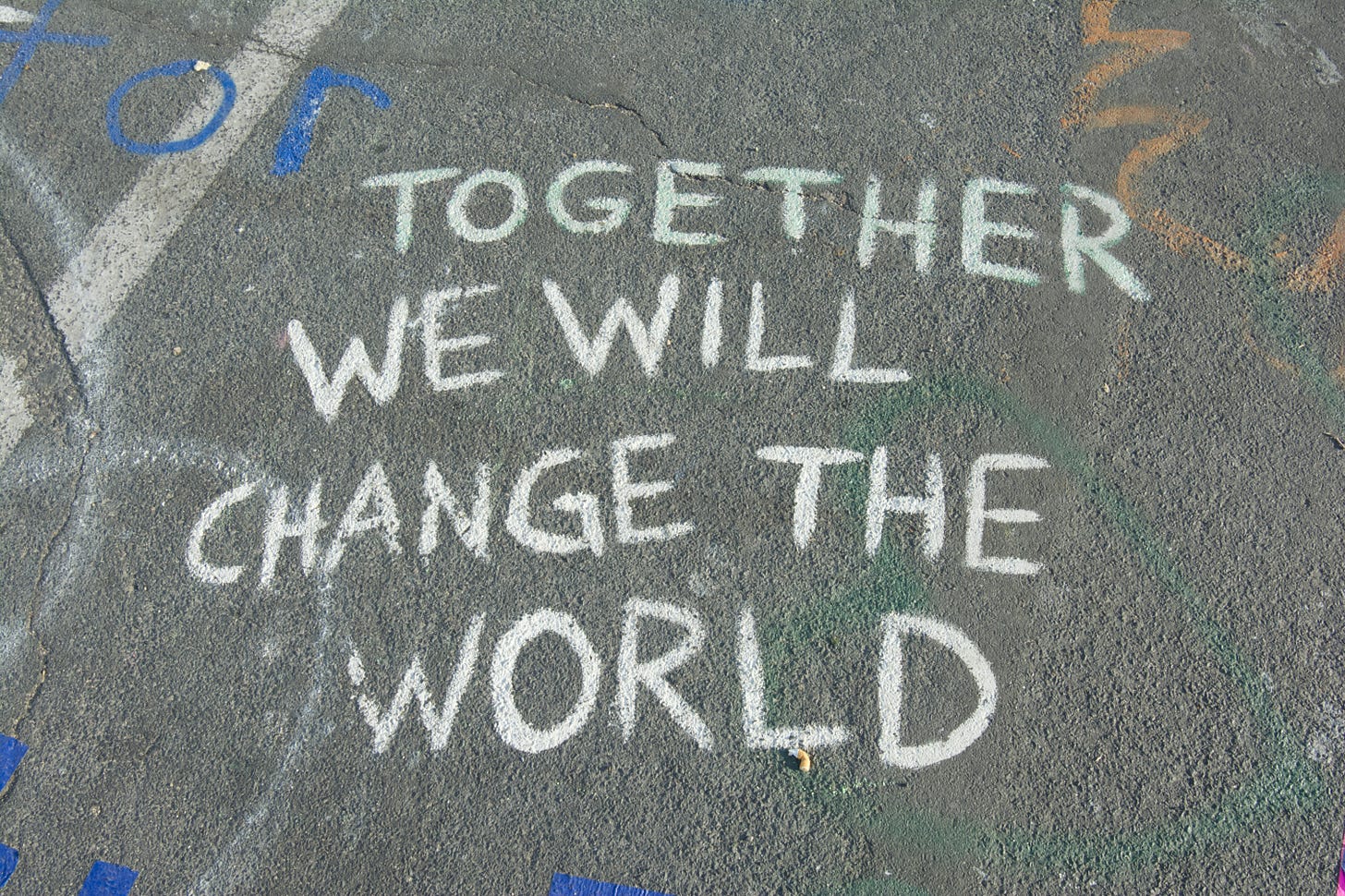Chalk on the Admin Building
On protest, responsibility, and growing up.

Somewhere towards late afternoon, my old boss asked about the chalk on the side of the Administration Building.
“The sidewalk is one thing,” she said. “But we can’t have people chalking the buildings.”
I nodded. It was a Tuesday in mid-April, sunny, crisp, and breezy. Naturally, some students were upset. Could've been anything, really. Happens every spring.
I took off my sport coat and laid it over a chair in my office, rolled up my sleeves, and went to the kitchenette in the basement. I didn’t spend much time on the “Garden Level,” as the fundraisers who worked down there called it, so I couldn’t find the light switch. I used the glow from the hall to locate an empty pitcher. Then a passing colleague saw me there in the dark, waving my hands as if performing some kind of incantation as the sink ran wide open behind me. He paused for a second, then thought better of it and moved on. It had been that kind of year in higher ed.
I gathered the pitcher and thin paper towels I’d charmed from the glitchy automatic dispenser, went up the stairs, and stepped into the sun. There was chalk on the Admin Building and it was my job to wash it off.
It was thick chalk, almost oily. The first jug of water didn’t do much. I filled it and tried again before deploying a paper towel. It hit the wet concrete and melted like cotton candy dropped into an expensive drink, the kind they serve at those cocktail bars I’d read about in Esquire but would probably never visit. I walked back down the stairs and returned with a full pitcher.
I admit that I didn’t spend much time thinking about censorship or administrative overreach. It was a clear policy violation to chalk a building. Besides, the cause was not one that had evoked much outcry on campus. The chalk was not protesting economic uncertainty or the Middle East. No, the college’s academic calendar had changed and a handful of graduating students were mad they couldn’t hang out on campus for a few more days before moving on to whatever came next.
After dwindling in length and popularity over the last several years, the new calendar meant that "Senior Week" had been all but eliminated. I learned later that extra days on campus were the decades-ago result of a need to buy time for the college’s registrar to get degrees finalized and printed before Commencement. That practice had ended, but the idea of Senior Week as a celebration for the graduates remained. I guess to be a part of any organization is to participate in some level of myth-making. When the chalkers struck, the administration had already worked with the Student Senate on a celebration plan that made most seniors happy. The point, I guess, is that these things happen.
More water.
A part of me can’t blame them for wanting to stay on campus just a little bit longer. And who am I to judge? God knows I’ve stuck around at this place for a long time by now. Eighteen years since I came here as a first-year student, half my life I’ve been living and dying on this hill.
Scrubbing the wall, I wondered if my perceptions of 1960s activism were exaggerated. The history books and documentaries growing up had me believing that every protest march led to victory and every campus in the country was a hippy colony or Black Panther den. I decided that wasn’t the case after all. Whatever the cable news says, it hadn’t been like that then and it wasn’t now.
More paper towels.
What makes a person accept or reject the status quo? Has the explosion of real-time news media made protests seem cringy or routine? How does a person choose to be a bystander, an advocate, or an activist? Do they choose at all? What makes someone align so strongly with a cause that they take up the chalk, or something stronger? Should I have moved back to my hometown and sold insurance instead of building a career at a residential liberal arts college?
Probably.
More water, more paper towels.
The facilities office could have taken care of it, but it didn’t feel right to ask someone else to tidy this mess. A custodian didn’t make the decisions that led to the loss of Senior Week, some administrators and a faculty committee did. And sometimes the students protest. It’s a part of the learning experience. Besides, it was a nice enough afternoon.
When I was done, the walls of the Admin Building were clean but the chalk on the sidewalk remained dry and legible. I went back inside and climbed the stairs to my office to see what was next.
I’ve been trying hard to be a kinder person lately, slower and softer in judgment, quicker to say “thank you” or "good job."
I’ve been trying to clean things up when I can.


